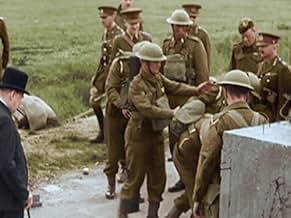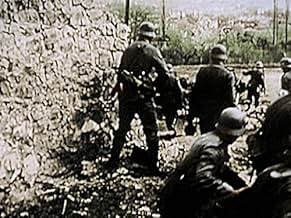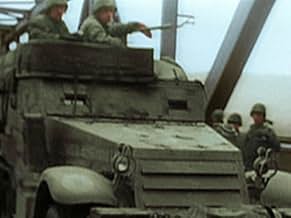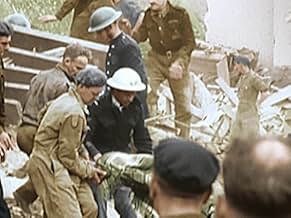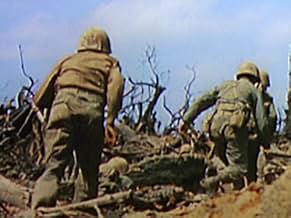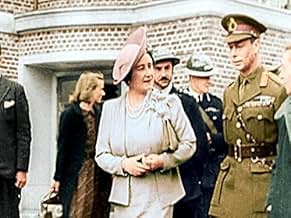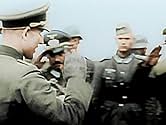CALIFICACIÓN DE IMDb
8.7/10
7.8 k
TU CALIFICACIÓN
Relata los eventos de la Segunda Guerra Mundial en color.Relata los eventos de la Segunda Guerra Mundial en color.Relata los eventos de la Segunda Guerra Mundial en color.
Explorar episodios
Opiniones destacadas
This show demonstrate how unreliable human being are and how far they go due to their incomplete and sometimes wrong believes.
Going through the events occurred during WW II over and over again coming to conclusion that human will eventually destroy itself is inevitable.
The irony is human being having concerns regarding artificial intelligence and machine controlling human life. Yet that could be the only solution to not let human being destroy itself.
All these events happen about a century ago and still we see several evidences, that even up to presidential level of super power countries acting the same if not worse and supported by millions of people.
Seriously, we should not only let but beg machines to save us from ourselves before it is too late.
Going through the events occurred during WW II over and over again coming to conclusion that human will eventually destroy itself is inevitable.
The irony is human being having concerns regarding artificial intelligence and machine controlling human life. Yet that could be the only solution to not let human being destroy itself.
All these events happen about a century ago and still we see several evidences, that even up to presidential level of super power countries acting the same if not worse and supported by millions of people.
Seriously, we should not only let but beg machines to save us from ourselves before it is too late.
The segment "The Island War" treats the liberation of the Phillipines as an unnecessary and overly costly (and therefore ill-advised) operation. However, that totally fails to recognize that in war, there are both military and political concerns and that grand strategy requires the consideration of both. War is, quite simply, foreign policy pursued by other means. Therefore, foreign policy has to be considered in the strategy of the war.
Because the USA had a commitment to the Phillipine people as a protectorate, it was politically necessary to return as soon as was humanly possible. MacArthur may have left, but Phillipine guerrillas had been fighting and dying against the Japanese with US supplies and coordination from the very beginning. To ignore a chance to liberate the Phillipines would have been no different than leaving Paris in German hands while liberating Holland and Belgium. It was politically imperative! Likewise, the episode maintained that the "Northern arm" of the Japanese pincer had "only pretended to retreat and under cover of darkness had reversed course..." both Japanese and American accounts, much closer to the event when interviews with actual participants were available, indicated that the Northern force actually intended to retreat and only reversed course following critical comments from the high command.
Halsey had every reason to have believed that the Northern force was less a threat than Ozawa's aircraft carrier force which had just been spotted. Every previous naval victory in WWII had come at the hands of the aircraft carriers, NOT the battleships. When confronted by two enemies... one with a knife and the other with a machine gun, only the fool deals with the knife first! There were American POWs held in the Phillipines. Many were saved during this operation. The civilian casualties were indeed great, but that was the choice of the Japanese occupiers and how many would've died, either of brutality or starvation had the islands been bypassed? The further we get from WWII, the less accurate do the "documentaries" become. You can tell a good story with the films, but unless you have spent years studying the contemporary histories, from both sides... false conclusions will run rampant. As the last of the participants pass from this life, there can be no more "factual" accounts. The eyewitnesses are silent now. Don't just watch, READ, READ, READ the books that were published before 1960.
Because the USA had a commitment to the Phillipine people as a protectorate, it was politically necessary to return as soon as was humanly possible. MacArthur may have left, but Phillipine guerrillas had been fighting and dying against the Japanese with US supplies and coordination from the very beginning. To ignore a chance to liberate the Phillipines would have been no different than leaving Paris in German hands while liberating Holland and Belgium. It was politically imperative! Likewise, the episode maintained that the "Northern arm" of the Japanese pincer had "only pretended to retreat and under cover of darkness had reversed course..." both Japanese and American accounts, much closer to the event when interviews with actual participants were available, indicated that the Northern force actually intended to retreat and only reversed course following critical comments from the high command.
Halsey had every reason to have believed that the Northern force was less a threat than Ozawa's aircraft carrier force which had just been spotted. Every previous naval victory in WWII had come at the hands of the aircraft carriers, NOT the battleships. When confronted by two enemies... one with a knife and the other with a machine gun, only the fool deals with the knife first! There were American POWs held in the Phillipines. Many were saved during this operation. The civilian casualties were indeed great, but that was the choice of the Japanese occupiers and how many would've died, either of brutality or starvation had the islands been bypassed? The further we get from WWII, the less accurate do the "documentaries" become. You can tell a good story with the films, but unless you have spent years studying the contemporary histories, from both sides... false conclusions will run rampant. As the last of the participants pass from this life, there can be no more "factual" accounts. The eyewitnesses are silent now. Don't just watch, READ, READ, READ the books that were published before 1960.
The color process is both fantastic and jarring in bringing the our eyes old events that come back to life in a way that is emotional and very real. The old black and white films were like watching old history about a far past, but the color of the war film changes to feeling from memory to seeing moments in a new mind frame about that mentally sees the conflict in modern terms to appreciate and emotionally see and feel the events.
This long TV series, narrated by Robert Powell, whose tone expresses earnest and dispassionate interest, deals with World War II both in the East and West. I will now present you with a detailed history of the war in its entirety, along with an extensive psychoanalytic analysis of every person involved. Not just the principals but my Uncle Flory who was a corporal in the infantry, Hockey who was an aviation ordnance man in the Navy, a German guy I met in a bar in Italy who had served in the Wehrmacht on the Russian front, and my father-in-law who was an air raid warden in Philadelphia. Well, I would if I could but I can't.
Let's summarize it this way, just for the kids: Germany, Italy, and Japan start World War II around 1939. On the other side, the chief allies are Britain, Russia, and the USA. It was a terrible conflict. We won. I'll make just a few observations.
Some of the footage is familiar from black and white documentaries, but the colorization process has advanced since the earlier, crude attempts by Ted Turner and others. The viewer hardly notices the effects after a while.
It's interesting to compare the TV documentaries about the war from the perspective of their public appearance. In early series, like "Victory at Sea" (1952), only seven years after the end of the war, the enemy is still faceless and brutal. The insults may be subtle but palpable. Listen to the narrator's pronunciation of "the Japanese", with it's built-in sneer bespeaking disgust. Later, "The World At War" (1973) regards the war itself as appalling, an emotional experience as much as anything else. Olivier's narration is mournful. By the time of this documentary (2009), the war is treated as an awesome and terrible historic event, but one that can be looked at almost as moves in a geopolitical chess game. We still see corpses, the suffering of civilians, and we hear of the atrocities, but not nearly so often as earlier, and the narrator, Robert Powell, describes the goings on as if reading from a technical manual. The barely masked loathing of "Victory at Sea" is absent, and so are Olivier's tones of tired resignation.
The historical introduction to the beginning of the war in both theaters is nicely sketched in. And the description of events is sort of smoothed over and audience friendly. None of the battles is described in much detail. Controversy is avoided. Not much in the way of personalities either, except for a handful at the very top who are concisely introduced. If the Americans landed at Salerno and were saved from defeat only by naval gunfire -- well, "the Americans landed at Salerno." Did we bomb the fifth-century Benedictine monastery atop Monte Cassino, even though it was not occupied by German troops? Yes. "Out of desperation, the Allies bombed the monastery Monte Cassino" -- period. Did George Patton and Bernard Montgomery loathe each other? This space deliberately left blank.
The lacunae mask no essential points, but some of them are interesting or amusing in themselves. And, facing facts, some of the information left out is as important as what's left in. The "battle of Britain" is hardly mentioned. In Rommel's back-and-forth battles with the British across North Africa, not nearly enough emphasis is placed on logistics, which favored the Allied forces. They could be supplied through Egypt. Rommel, however, was dependent for the importing of essential supplies on one port, Tripoli. His fuel, food, water, replacements, and matériel passed through Tripoli. The supplies were shipped from Italy, a thousand miles across the Mediterranean Sea. Then, during Rommel's advances, they had to be schlepped across another thousand or more miles on a single desert road open to air attack. On top of that, the Brits had cracked the Italian naval code and knew when the transports would leave their ports in Italy. The transports were routinely sunk by Allied air and submarines, so virtually nothing was reaching Rommel. By the end, he was draining the fuel from some of his few remaining tanks in order to keep a handful of others operational.
The deciphering of Italy's naval code was kept so secret that in one instance an air attack was launched on a transport. The airplanes were already in sight of the target when it was discovered that the ship was carrying Allied POWs. The attack was never canceled. If it had been, it would have given away the game. I find details like these interesting. Maybe the producers did too but there simply wasn't room enough for them.
Some of the material not mentioned, like the American fighting spirit at Kasserine Pass, might just as well be forgotten. Overall, and considering the weight of the subject, it's quite well done.
Let's summarize it this way, just for the kids: Germany, Italy, and Japan start World War II around 1939. On the other side, the chief allies are Britain, Russia, and the USA. It was a terrible conflict. We won. I'll make just a few observations.
Some of the footage is familiar from black and white documentaries, but the colorization process has advanced since the earlier, crude attempts by Ted Turner and others. The viewer hardly notices the effects after a while.
It's interesting to compare the TV documentaries about the war from the perspective of their public appearance. In early series, like "Victory at Sea" (1952), only seven years after the end of the war, the enemy is still faceless and brutal. The insults may be subtle but palpable. Listen to the narrator's pronunciation of "the Japanese", with it's built-in sneer bespeaking disgust. Later, "The World At War" (1973) regards the war itself as appalling, an emotional experience as much as anything else. Olivier's narration is mournful. By the time of this documentary (2009), the war is treated as an awesome and terrible historic event, but one that can be looked at almost as moves in a geopolitical chess game. We still see corpses, the suffering of civilians, and we hear of the atrocities, but not nearly so often as earlier, and the narrator, Robert Powell, describes the goings on as if reading from a technical manual. The barely masked loathing of "Victory at Sea" is absent, and so are Olivier's tones of tired resignation.
The historical introduction to the beginning of the war in both theaters is nicely sketched in. And the description of events is sort of smoothed over and audience friendly. None of the battles is described in much detail. Controversy is avoided. Not much in the way of personalities either, except for a handful at the very top who are concisely introduced. If the Americans landed at Salerno and were saved from defeat only by naval gunfire -- well, "the Americans landed at Salerno." Did we bomb the fifth-century Benedictine monastery atop Monte Cassino, even though it was not occupied by German troops? Yes. "Out of desperation, the Allies bombed the monastery Monte Cassino" -- period. Did George Patton and Bernard Montgomery loathe each other? This space deliberately left blank.
The lacunae mask no essential points, but some of them are interesting or amusing in themselves. And, facing facts, some of the information left out is as important as what's left in. The "battle of Britain" is hardly mentioned. In Rommel's back-and-forth battles with the British across North Africa, not nearly enough emphasis is placed on logistics, which favored the Allied forces. They could be supplied through Egypt. Rommel, however, was dependent for the importing of essential supplies on one port, Tripoli. His fuel, food, water, replacements, and matériel passed through Tripoli. The supplies were shipped from Italy, a thousand miles across the Mediterranean Sea. Then, during Rommel's advances, they had to be schlepped across another thousand or more miles on a single desert road open to air attack. On top of that, the Brits had cracked the Italian naval code and knew when the transports would leave their ports in Italy. The transports were routinely sunk by Allied air and submarines, so virtually nothing was reaching Rommel. By the end, he was draining the fuel from some of his few remaining tanks in order to keep a handful of others operational.
The deciphering of Italy's naval code was kept so secret that in one instance an air attack was launched on a transport. The airplanes were already in sight of the target when it was discovered that the ship was carrying Allied POWs. The attack was never canceled. If it had been, it would have given away the game. I find details like these interesting. Maybe the producers did too but there simply wasn't room enough for them.
Some of the material not mentioned, like the American fighting spirit at Kasserine Pass, might just as well be forgotten. Overall, and considering the weight of the subject, it's quite well done.
As I do not know if these subtitles are written by Netflix themselves I feel the need to say that every episode of this series is full of very poor Dutch subtitles. Not only mistranslated words but even very simple spelling faults in a lot of words themself. From a platform as Netflix I expected more profesionality before they dare to launch a serie.
¿Sabías que…?
- TriviaThough not listed among crew, the show credits Blair Wallace as colourist for the series.
- ConexionesFeatured in History Buffs: Saving Private Ryan (2016)
Selecciones populares
Inicia sesión para calificar y agrega a la lista de videos para obtener recomendaciones personalizadas
- How many seasons does World War II in Colour have?Con tecnología de Alexa
Detalles
- Tiempo de ejecución51 minutos
- Color
- Relación de aspecto
- 16 : 9
Contribuir a esta página
Sugiere una edición o agrega el contenido que falta

Principales brechas de datos
What is the French language plot outline for World War II in Colour (2009)?
Responda
